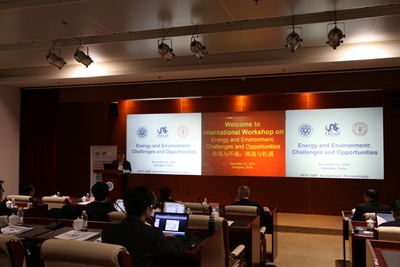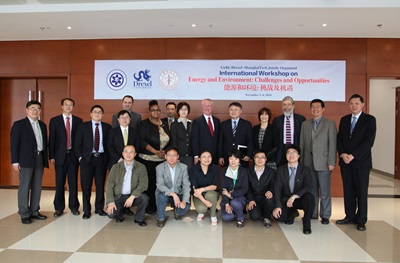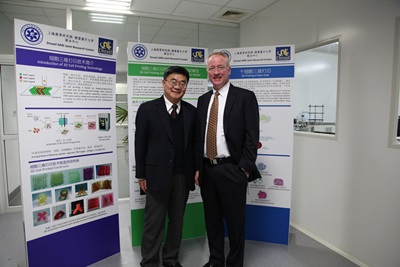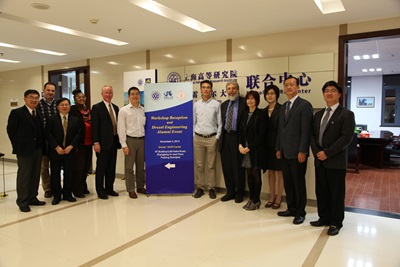
The “International Workshop on Energy and Environment: Challenges and Opportunities” was successfully held at the Shanghai Advanced Research Institute (SARI), Chinese Academy of Sciences on November 3 - 4, 2014. SARI is a laboratory that works in collaboration with ShanghaiTech, a new and elite technical university that is modeled after the California institute of Technology. ShanghaiTech is the first of its kind in China, in that it follows an American model as opposed to China’s typical approach to higher education. Drexel graduate Jiang Mianheng, who is now President of the SARI, spearheaded the project. Wei Sun, the Albert Soffa Chair Professor from Drexel University’s Mechanical Engineering and Mechanics department, and Director of the Drexel-SARI Center, organized the workshop.

Approximately 50 people were in attendance including Drexel faculty and researchers from ShanghaiTech, as well as students who attend the Institute. President Jiang Mianheng and Vice President Jinkang Gong from ShanghaiTech University were in attendance, along with President Songlin Feng, Vice President Yuhan Sun, and Weiguang Huang from SARI. Attendees from Drexel University included Charles Haas, LD Betz Professor and Department Head of Civil, Architectural, and Environmental Engineering, Julie Mostov, Vice Provost for Global Initiatives, and Joseph B. Hughes, Dean of the College of Engineering. The keynote speakers from Drexel included Dean Hughes and Charles Haas. Upon his return to Drexel University, Hughes provided some insight into the creation of the workshop, as well as the goals that it set out to achieve.
Being that the United States and China are the two largest energy economies in the world, the workshop aimed to bring a common focus of energy and the environment to the forefront of discussion. Hughes specifically spoke about what he calls, “The North American Energy Revolution.” He described this as the dramatic change over the last five years in energy technology in the United States. “Most Americans don’t even know about it,” Hughes stated. “It’s probably the biggest economic play that the United States has seen since we hit oil.” In the past, there was concern over the scarcity of energy. Now, we are almost, if not already, energy independent. With this newfound abundance of energy, there is a need for conservation by focusing on energy efficiency and pollution reduction. “The fact that we are no longer reliant on anybody but ourselves for our energy is unbelievable,” he went on to say.
In his keynote presentation, Hughes highlighted the variety of energy sources now available, from natural gas and hydropower to biofuels. As Hughes puts it, curbing the planets current consumption of energy is “the challenge of an era” that both the United States and China now understand. When asked about President Barack Obama and China’s President Xi Jinping’s recent pledge to cut their countries levels of pollution, Hughes said that Obama’s goal to cut U.S. emissions by 26-28% by 2025 is “easily reached if we just quit tripping over ourselves and just do it. If we convert from coal to natural gas when we can and put research into energy storage, we’re just going to solve it.”

Hughes hopes to make this workshop an annual event. The location is still up for discussion, but it will most likely remain in Shanghai. Hughes also said that having more students, from both Shanghai and Drexel, present at the workshop is a goal for the future. ShanghaiTech will soon be looking for Drexel students to co-op there, and benefit from the exposure to the city and culture. Ultimately, this workshop allowed innovative minds in the energy and environmental fields from two different institutions to share and discuss ideas, and to open the door for future collaborations.

Being a seasoned traveler and having been to China many times, Hughes said that altogether the trip was brief, but enjoyable. When asked if there was anything that was most memorable, he said that he enjoyed some really good Italian food in Shanghai. However, he also had a less enjoyed meal. “I learned that I don’t like donkey,” Hughes laughed. “Donkey does not taste like chicken.”
For more information about Hughes’ presentation, please click
here to view his Powerpoint presentation.